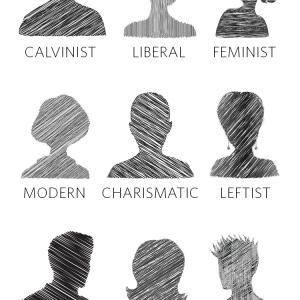
Stephen Mattson is the author of the social justice devotional On Love and Mercy: A Social Justice Devotional. You can follow him on Twitter (@StephenMattson_) or on Facebook.
Posts By This Author
An Inconvenient Truth: Everyone Is Created and Loved by God
Sometimes we dehumanize people by speaking, thinking, or imagining about them in generalizations, by covering their true identity with generic labels and terms that are impersonal, cold, and less meaningful. For example, you can refer to your brother as “someone that I know” or your best friend as “this one guy.”
We often do this when we want to create separation or disassociate from others — often in order to protect ourselves, make ourselves look better, or attack others. Thus, we refer to our spouse as “this person I know” when we’re agreeing with a coworker about people who hold an opposing political belief we disagree with, or offhandedly use the phrase “this guy I know” about our dad when talking about annoying habits that we can’t stand.
We see Peter do the same thing in the Bible, referring to Jesus — his savior, closest friend, companion, teacher, and leader — as simply “him” when being accused of knowing Jesus right before the crucifixion.
Luke 22: 56-57: Then a servant girl, seeing him as he sat in the light and looking closely at him, said, “This man also was with him.” But he denied it, saying, “Woman, I do not know him.”
I don’t know “him.”
One word: him.
No harm done, right? It’s just a simple pronoun.
We do the same thing all of the time.
Him, her, she, he, them, those people, etc.
As innocent as this practice may seem, the ideas behind them are more cynical, and it becomes much more serious for Christians when we use terms, thoughts, and ideas as a way to disconnect people from God.
Can The Privileged Imagine Injustice?
Imagination is defined as, "The faculty of imagining or of forming mental images or concepts of what is not actually present to the senses."
For privileged Christians who have lived the majority of their lives receiving the benefits of systematic wealth, power, comfort, favor, and convenience, it can be almost impossible to conceive of a world where injustice, inequality, and perpetual oppression are daily struggles.
Many privileged believers experience an entire existence completely devoid of the suffering, trials, and endless forms of racism, stereotyping, and injustice that are the daily realities faced by the likes of Trayvon Martin, Michael Brown, Eric Garner, and millions of others who have lived under completely different — and radically unfavorable — circumstances.
Thus when parties from both sides try to communicate with one another, it is extremely difficult, frustrating, and nearly impossible to even begin to comprehend each other’s worlds — unless you utilize the spiritual discipline of imagination.
In the Bible, Jesus is constantly challenging the status quo and striving for justice, peace, and reconciliation against cultural factors and precedents that seem impossible to overcome. For the human vessels that God calls upon, they are required to imagine the inconceivable, accept the unthinkable, and break out of their stubborn paradigms in order to embrace the Divine.
7 Ways I Would Do Christianity Differently
Faith is a journey, a Pilgrim’s Progress filled with mistakes, learning, humble interactions, and life-changing events. Here are a few things I would do differently if I could go back and start over:
1. I wouldn't worry about having the right answers.
There’s a misconception that the Bible is the Ultimate Answer Book and Christianity is a divine encyclopedia presenting the solutions to life’s biggest questions. In reality, the Christian faith is about a relationship with Christ instead of an academic collection of right or wrong doctrines.
Rather than wasting time, energy, and resources on superficial theological issues — I would focus more of getting to know Jesus. Never let a desire for “being right” obstruct your love for Christ.
5 Things You Should Know Before Becoming a Christian
Few things are presented more inaccurately than Christianity. Often marketed through evangelism as a joyful, peaceful, loving, easy way to overcome the hardships of this world, in reality practicing Christianity is far more grueling than many pastors, churches, theologians, and Christian institutions make it out to be.
Christianity isn’t meant to be a form of escapism, a safety net, or a crutch. Rather, following Jesus means bravely sacrificing yourself for the love of humanity, becoming nothing for the sake of others.
So instead of preparing people for failure, impossible expectations, disappointment, and false illusions, here are five things everyone should know before becoming a Christian.
6 Monumental Questions Facing Every Church In America
Christianity is a lifelong journey of learning new things, growing in wisdom, and interacting with a wide array of difficult topics. Boldly asking tough questions is essential to spiritual development.
Today, few questions are as important, impactful, meaningful, or divisive within Christianity as the following six:
1. Is homosexuality a sin?
While much of society continues to accept homosexuality as being a culturally and morally acceptable practice, many Christian institutions, organizations, and communities still consider it sinful.
Increasingly, Christians who publically denounce homosexuality are perceived as homophobic, bigoted, and on the completely wrong side of a major human rights movement. This results in the Christian faith being wholeheartedly rejected by a modern population that sees this type of fundamentalism as incompatible with modern ethics and conventional wisdom.
But other churches, denominations, and spiritual communities are changing — and some have fully embraced and supported gay rights.
Christianity currently finds itself facing four basic responses: 1) support homosexuality, 2) reject it as sinful, 3) accept it but still claim it’s sinful, and, 4) ignore the issue as much as possible.
Believers are deeply divided on the issue, and ultimately your stance on homosexuality defines much of what you think about God, theology, church, sin, and salvation.
This is one of the defining question facing today’s Christians, and many are still processing through what they believe and struggling to come up with an adequate answer.
To Spiritually Thrive, We Must First Spiritually Survive (And Help Others Do the Same)
Theology doesn’t save us from spiritual burnout — people do.
No matter how convincing our doctrines and beliefs may be, they’re ultimately empty and unsatisfying if there’s no human relationship personifying them.
Throughout our faith journeys we’ll be faced with moments of suffering, hopelessness, and sheer desperation — sometimes lasting for what seems like forever. We’ll want to give up — sometimes we will.
These hardships can devolve into isolation, bitterness, and ultimately transform what was once a healthy spirituality and turn it into a total rejection of God. Within Christian culture we label this as “burnout,” but in reality it’s more of a “falling out.”
Not only do we have a falling out with God, but we also disassociate ourselves from other believers and those closest to us. When we feel hurt, betrayed, or abandoned by people we assume God is to blame, causing us to doubt God’s love for us — even questioning God’s very existence.
Many quit faith not because of a newfound disbelief in God, but because of broken and unhealthy human relationships — people are the main reason we give up on God.
When Christians Lack Imagination, They Lack Love
Christians often talk about actively changing the world, but too often, we just sit still and passively watch the struggles of others without participating, leading, or caring. We don’t love.
Why? Because many Christians have an inability to use their imaginations.
People who can’t imagine are susceptible to bigotry, racism, hatred, and violence toward others. Why? Because they can’t imagine any other scenario, perspective, or opinion other than their own. They have an inability to see themselves in someone else’s shoes. They can’t see beyond their own narrow reality.
When you can’t imagine, you can’t empathize, understand, or relate with the actions, struggles, pain, suffering, persecution, and trials of others — you become apathetic, unmoved, stoic, and inactive.
Whether our differences are gender-related, age-related, race-related, culturally related, politically related, economically related, socially related, theologically related, value-related, or related to any countless number of factors, overcoming them requires imagination.
When you can’t imagine, you can’t celebrate, appreciate, admire, and joyfully love others. You disconnect yourself from humanity.
Jesus Wasn't American—Neither Is The Bible
Unfortunately, American values are often completely in conflict with the Gospel of Jesus.
We point to the Bible and use verses like Romans 13:1-7 to show that it’s actually God-ordained to submit to our governmental authorities and pay taxes, support our military, and proudly back our country’s actions.
We obviously don’t think these same verses apply to other governments, other authorities, and especially not to our enemies’ empires. Surely Romans 13 wasn’t meant for dictatorships, communist regimes, and states that are unfriendly and uncooperative with the U.S. Citizens of those nations should revolt, rebel, and join our cause—that Biblical text is only applicable to an American government, in an American society, benefitting American citizens.
Imagine how we would react if our faith in God superseded our national identity?
Have Churches Become Too Shallow?
Christians ultimately attend church to meet with God. But sometimes we turn our churches into distractions, and spiritual leaders mistakenly prioritize things beyond God, becoming obsessed with marketing, consumerism, and entertainment — creating false idols.
The diluting of church happens in both subtle and obvious ways:
Scripture is substituted for a stirring YouTube video.
Worship is tweaked to incorporate flashing lights, fog machines, and synchronized graphics.
Visitors are given nicer gift baskets.
Contests are held. Websites are updated. Social media is expanded. Apps are developed. Promotional clothing is given away — a brand is created.
'Christianity' Is Not a Personality Trait
It’s tempting for many Christians to put on a disguise. This is especially true of people within church leadership. Expectations need to be fulfilled, roles need to be played, and responsibilities must be carried out. This is the biggest danger of the Christian alter-ego: pretending to be someone we’re not.
Four Ways Children Do Faith Better Than Adults
It’s easy for the faith of children to go unnoticed. But here are four spiritual things kids do better than adults:
They Ask Questions:
Nobody asks more — or better — questions than children. “Who?” “What?” “Where?” “When?” and “Why?” are expressions patented by kids everywhere. They’re obnoxiously curious and want to know everything about everything.
They aren’t afraid to ask the most difficult and messy questions. Too often we mistake spiritual maturity for certainty, and lose our thirst for discovery. Kids remind us how to approach God — truthfully, stubbornly, inquisitively, and tirelessly.
5 Reasons Christians Avoid Accountability and Don't Confront Sin
Spiritual accountability and discipline are slowly becoming extinct within church communities Here are some reasons why:
1. A Desire for Comfort and a Fear of Conflict:
Confrontation is awkward, messy, and just plain hard — so few do it. Additionally, churches and spiritual communities are intentional about creating a sense of peace, encouragement, happiness, and joy — even if it’s a façade.
Identifying sin, exposing immorality, admitting the truth, uncovering corruption, and acknowledging failure contradict the image many churches are trying to portray.
In reality, Christianity was never meant to be comfortable or easy, but in a society obsessed with self-gratification, pleasure, and comfort, churches too easily succumb to an attitude of placation and appeasement instead of responsibility and intervention.
The Problem with Labels
Christianity is full of labels.
Does caring about the environment make me a Liberal Christian?
Does opposing to the death penalty make me a Leftist Christian?
Does believing that women can preach make me a Christian Feminist?
Does believing in anti-violence make me a Christian Pacifist?
Does taking an anti-war stance make me an Anabaptist Christian?
The Struggles of Christian Parenting
Every mother and father know the struggles, frustrations, unrealistic expectations, horrific fears, and exhaustive drama associated with raising children, but let me just say this: Christianity adds an entirely new dimension to the chaos that is parenting.
Besides an assortment of play dates, sports activities, school classes, music events, and other social obligations, Christianity requires the additional burden of attending an endless array of church activities.
Mission trips, youth groups, service projects, summer camps, volunteer activities, Sunday school classes, Bible studies, evangelism outings, and church services require tons of time — it’s a huge commitment.
Christian culture goes out of its way to accommodate parents and their children, and while this is a good thing, it also adds social expectations that can often feel burdensome and frenetic — leading to burnout.
What Type of God Do You Believe In?
Sometimes it's hard to blame people for rejecting God, because many Christians present a God that is ugly, cruel, unfair, and utterly horrific. Thus, when people avoid Christianity, they're actually shunning their ugly perception of it.
When you hear people talk about God, what type of God are you imagining? When you speak of God, what type of God are you communicating?
Unfortunately, society's obsession with success, politics, business, security, wealth, and comfort has hijacked the way we see and interpret God — even Christians are guilty of this.
It's easy to manipulate God to fit our own agendas, to use religion to rationalize our actions, to wield spirituality as a weapon, and manipulate theology to rationalize our sins.
According to the Bible, You Might Be a Christian If …
Many people exploit the Bible to furiously cast judgment on others — sinfully using condemnation, guilt, shame, fear, and hatred to abuse others — all under the guise of “accountability” and the false premise of “Christianity.”
But according to the Bible, various people were used by God to do amazing things, and these individuals were often described as righteous and holy … even though they were dramatically flawed.
To be human is to be imperfect, and although we shouldn’t glorify sin or purposefully live in sin, we need to be careful about labeling others at “heretics,” “unbelievers,” and “sinners.” Because in reality, contrary to everything we assume, those whom we detest just might be favored by God.
Sinful attributes and misdeeds don’t disqualify you from a life of holiness, righteousness, and Godliness, but we often treat people as such — and condemn them to an eternity in hell. But according to the Bible, you might be a ‘Christian’ even if …
Christianity's Most Common and Subtle Sin
Christianity’s most common and subtle sin is … rationalization.
‘Rationalization’ is defined as: an attempt to explain or justify (one's own or another's behavior or attitude) with logical, plausible reasons, even if these are not true or appropriate (Wikipedia).
Essentially, rationalizing is a way of making excuses.
Ever since Adam tried to blame Eve (Gen. 3:12), Moses tried to downplay his ability to lead God’s people out of Israel (Exodus 3), Aaron tried to deflect blame for the Golden Calf onto others (Exodus 32:22), Gideon’s self-deprecation (Judges 6), and Jeremiah’s excuse of being too young (Jer. 1:6), people have rationalized their rebellion to God.
Creating logical, plausible, and valid explanations to justify our sinful actions — or inactions — is easy. We do it all the time because instead of being obviously and visibly wrong, it’s covert, motivated by fear, doubt, shame, and guilt, and mixed with what we assume is intellect and reason — in reality it’s a form of spiritual escapism.
Rationalization is a type of invisible rebellion. It’s hidden not just from us but from everyone. Therefore, it’s rarely noticeable and hardly ever called out. People aren’t held accountable for being reasonable.
But being a follower of Christ often demands being unreasonable.
The Tribes of Rob Bell, Mark Driscoll, John Piper ... and Jesus
Christianity consists of thousands of tribes, cliques, and communities — each with different theologies, traditions, and doctrinal beliefs. Within a Westernized society obsessed with celebrity, entertainment, popularity, conflict, and money, it can be easy for Christian groups and communities to clash with each other.
For the modern church, much of its recent legacy has involved conflict, division, and controversy. Christians have developed a love-hate relationship with theologians, pastors, and church leaders — and it’s dividing the church.
Many Christians see their faith journeys as series of either/or situations and decisions — this is bad. Because as much as we want things to be clear, concise, and black-and-white, reality is complex and messy.
Pride, greed, hatred, bitterness, fear, and ignorance often cause Christians to promote distrust instead of unity — but what if Christians were more patient, graceful, and forgiving of each other?
For the Love of God, Love Others
“Christianity” is often used to manipulate, control, shame, judge, and hurt others. It’s influenced by politics, popularity, wealth, success, pride, hate, fear, selfishness, and a desire for power. The poisoning of our beliefs — or theology — happens subtly, under the pretense of tradition, teaching, education, discipline, authority, respect, and religion.
We often treat theology similar to politics, where our beliefs and doctrines are based on which ones benefit us the most.
We strive to get everything we can from our faith, and this can lead to spiritual narcissism, where we become obsessed with maximizing the benefits for ourselves while withholding them from others.
Rarely do we adhere to — or agree with — theological ideas that benefit someone else more than us. Sacrificing our own comforts for the sake of others is absurd — which leads to a sense of divine favoritism.
The Search for Flight 370 Reveals Four Basic Truths About Humanity
The search for Malaysia Airlines Flight 370 has captivated the media and press for days. How could we simply lose a plane? But the story reveals much more about our humanity and spirituality than we realize. Here are four simple revelations that we’ve learned about ourselves during this process:
1. We Crave Answers and Explanations:
As of this writing, Malaysia Airlines Flight 370 has yet to be found (a new breakthrough has possibly led them to the crash site), but the series of unusual circumstances has created an endless amount of theories that have fed our insatiable curiosity. As other world events continue to unfold — including the possibility of a major war involving Russia and Ukraine — we’re addicted to the story of the missing plane. But why?
Deep down, we all want answers. The worst case scenario is that we’ll never know. Mystery and confusion is contrary to everything within our current society — a culture obsessed with logic, data, information, and knowledge. Surely there’s some reason the plane is missing — there had to be — but right now we just don’t know why, and it’s driving us crazy.
The search for answers and meaning motivates our politics, jobs, relationship, and spirituality — and nothing proves this more than our current infatuation with flight 370.
We often treat our faith as an ongoing investigation — desperately looking for answers.



















